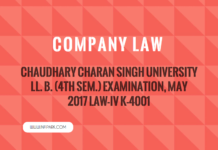Q.9c). “The directors are the mere trustees and agents of the company-trustees of the company’s money and property; agents in the transaction which they enter into on behalf of the company.” Whether do you agree with this dictum? Give reasons for your answer. Or Explain the true position of directors of a company.
Ans. Legal position of directors.-“The directors are the mere trustees and agent of the company-trustees of the company’s money and property; agent in the transaction which they enter into on behalf of the company.” The dictum represents in nutshell the true legal position of directors of a company to a great extent but certainly if does not represent the whole picture of the position of directors. The following discussion will throw a considerable light on the legal position of directors. What is the position of directors is not a question to be easily answered as this dictum tries to put. There is a sharp cleavage of opinions on this point and ii is desirable to examine the various view points.
Directors-How far employees.- A director of a company is not an employee of the company. But because of the nature of work he performs, or by virtue of a special contract, he may be regarded as an employee of the company. (Kothandararnan v. Commissioner of Income Tax, A.I.R. 1967 Mad. 143).
Directors-How far agents.-The company is no person; it can act only through directors and the case is, as regards those directors merely the ordinary case of principal and agent. (Fergusonw. Wilson, 36 L.J. Ch. 67). The true position of directors seems to be that of agents for the company with powers and duties of carrying on the whole of its business subject to the restrictions imposed by the articles and the statutory provisions. (Faure Electric Accuinuolator Co., (1888) 40 Ch. D. 147). In their position as agent for the company, the directors are not liable for the contract they enter into unless they contract in their own names. A director never enters into contract for himself but for his principal, i.e., for the company of which he is a director and for whom he is acting. He cannot be sued on such contracts nor can he sue on them unless he exceeds his authority [Smith v. Anderson, (1888) 15 Ch. D. 2471, Even if they make a contract which is ultra vires and so cannot bind the company the directors do not render themselves liable except on an implied warranty of authority [Weeks v. Propert, (1873) L.R. 8 C.P. 4271. Directors arc, however, not agents for individual shareholders. A company is a distinct legal person apart from the shareholders. Directors are agents of the company and not for the individual shareholders.
Directors-How far trustees.-Directors are sometimes called trustees for the company. It was held in Ramaswami lyer v. Brahmayya and Co. (1966) 1 Comp. L.J. 107 (Mad)7 that “the directors of a company are trustees for the company, and with reference to their power of applying funds of the company and for misuse of the power they could be rendered liable as trustees and on their death, the cause of action survives against their legal representatives”. They have often been called quasi trustees for the company with respect to its capital. Similar are the observations of Lord Romilly in York and North Midlands Railway Co. v. N. Hudson, 16 Bev. 485. “the directors are persons selected to manage the affairs of the company for the benefit of the shareholders; it is an office of trust which, if they undertake, it is their duty to perform fully and entirely.”
In R.K. Dalmia v. Delhi Administration, 1962 S.C. 1281, Mr. R.K. Dalmia was the Director and chairman of the Company. By a resolution the Board of Directors of the company authorised one Mr. Chobhani to operate on the accounts of company and further instructed due Bank to accept instructions with regard to the withdrawals from Chobhani on behalf of the Company. Chobhani used to purchase and sell securities on behalf of the company. But he was not empowered by any resolution of the Board of Directors to purchase and sell securities. Later on Dalmia, Chobhani and others were prosecuted on a charge of conspiracy and embezzlement and it was alleged by fhe prosecution that Chobhani purchased and sold securities under the instructions from Dalmia. Dalmia and Chobhani on the other hand stated that Dalmia had authorised Chobhani in general to purchase and sell securities and that it was in pursuance of such authorisation that Chobhani on his own purchased and sold Securities without any further reference to Dalmia or further instructions from Dalmia.
Their Lordships summarised the position of Directors thus: Directors arc not only agents but they are in some sense and to some extent trustees or in the position of trustees.
The directors are the mere trustees and agents of the company, trustees of the Company’s money and property-agent in the transaction which they enter into on behalf of the company /Great Eastern Railway Co. v. Turner, (1812) 8 Ch. D.1491. Directors are called trustees. They are, no doubt, trustees of assets which have come into their hands, “or which are under their control. Their Lordships then held that Dalmia and Chobhani both were entrusted with the dominion over the funds of the company in the Banks. A director is certainly not a trustee in fullest sense of the term:
(i) In the first place, unlike a trustee, the property of the company is not legally vested in him.
(ii) In the second place, he is a commercial map managing a trading concern for the benefit of himself and other shareholders in the company. A trustee, however, never manages the trust property for his benefit,
(iii) In the third place, as observed by Lord Justice James in Smith v. Anderason, 15 Ch. D. 274; “The distinction between a director and a trustee is an essential distinction founded on the very nature of things. The office of a director is that of a paid owner and as master subject only to an equitable obligation to account to some persons to whom he stands in relation of a trustee and who are his cestui title trust (beneficiaries). The office of a director is that of a paid servant of the company’. A director never enters into a contract for himself, but he enters into contracts for his principal, i.e.; the company whose director he is and for whom he is acting. He cannot be sued unless he exceeds the authority. “This seems to be the broad distinction between director and a trustee.” Jessel, M.R. says “that directors are, no doubt, trustees of the assets which come into their hands, or which are under their control but they are not trustees of the debts due to the company.”
In conclusion it may be said that “the directors are both trustees and agents of the company-trustees of the company’s money and property, and agents in the transactions which they enter into on behalf of the company.” In Great Eastern Railway Co. v. Turner, L.R. 8 Ch. D. 149, Jesse], M.R. says, “Directors have sometimes been called trustees or commercial trustees, and sometimes they have been called managing partners. It does not much matter , what you call them so long as you understand what their true position is, which is that they are commercial men managing a trading concern for the benefits of themselves and all other shareholders in it.”
But perhaps Topham speaks the truth when he says “Directors are described as trustees, agents or managing partners, not as exhausting their powers and responsibilities but is indicating only useful points of views.”




















